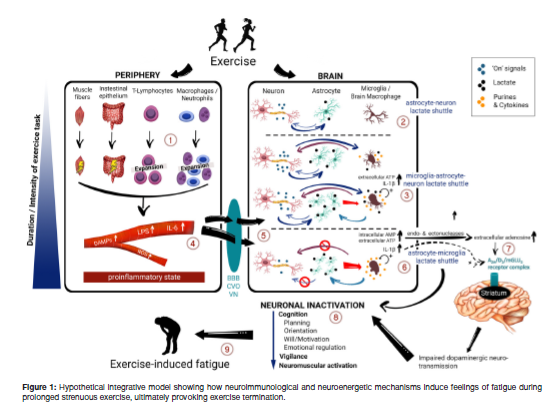Neuroimmunological and Neuroenergetic Aspects in Exercise-Induced Fatigue - Neuroimmunology of exercise
EIR 25 2019
Abstract
Feelings of fatigue not only occur in chronic and acute disease states, but also during prolonged strenuous exercise as a symptom of exhaustion. The underlying mechanisms of fatigue in diseases seem to rely on neuroinflammatory pathways.
These pathways are interesting to understand exerciseinduced fatigue regarding immune system to brain signaling and effects of cerebral cytokines. Activation of the immune system incurs a high-energy cost, also in the brain. In consequence immune cells have high energetic priority over other tissues, such as neurons. A neuronal inactivation and corresponding changes in neurotransmission can also be induced by end products of ATP metabolism and elicit feelings of fatigue in diseases and after intensive and prolonged exercise bouts. Since there are no existing models of exercise-induced fatigue that specifically address interactions between neuroimmunologic mechanisms and neuroenergetics, this article is combining scientific evidence across a broad range of disciplines in order to propose an inflammation- and energy-based model for exercise-induced fatigue.
Read the article

Abstract
Feelings of fatigue not only occur in chronic and acute disease states, but also during prolonged strenuous exercise as a symptom of exhaustion. The underlying mechanisms of fatigue in diseases seem to rely on neuroinflammatory pathways.
These pathways are interesting to understand exerciseinduced fatigue regarding immune system to brain signaling and effects of cerebral cytokines. Activation of the immune system incurs a high-energy cost, also in the brain. In consequence immune cells have high energetic priority over other tissues, such as neurons. A neuronal inactivation and corresponding changes in neurotransmission can also be induced by end products of ATP metabolism and elicit feelings of fatigue in diseases and after intensive and prolonged exercise bouts. Since there are no existing models of exercise-induced fatigue that specifically address interactions between neuroimmunologic mechanisms and neuroenergetics, this article is combining scientific evidence across a broad range of disciplines in order to propose an inflammation- and energy-based model for exercise-induced fatigue.
Read the article

